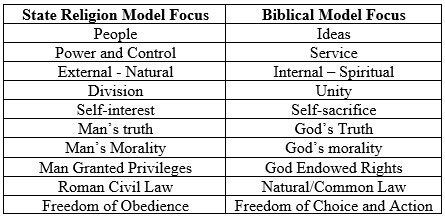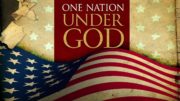We can now look at Christian Nationalism. What is it? It is a label, simply another critical theory application. Whether the label sticks or not depends upon us. I’m going to open with a few definitions from Webster’s 1828 dictionary.[1] Noah Webster, a Founding Father, put this dictionary together. His definitions connect us with America’s founding ideas.
Christianity n. – [T]he system of doctrines and precepts taught by Christ, and recorded by the evangelists and apostles.
Christian n. – A believer in the religion of Christ.
Christian a. – Pertaining to Christ, taught by him, or received from him as the christian relation; christian doctrines.
National a. – Pertaining to a nation; as national customs, dress, or language. 2. Public; general; common to a nation; as a national calamity. 3. Attached or unduly attached to one’s own country. The writer manifested much national prejudice. He was too national to be impartial.
Patriotism n. – Love of one’s country; the passion which aims to serve one’s county.
The term nationalism did not appear in the English language at this time. All these terms are either nouns or adjectives. They either name a thing or describe it. The closest word to today’s nationalism term is the third meaning for ‘national’, and it is an adjective rather than a noun. Patriotism is included as Christian nationalism articles often draw a difference between the two.
A Critical Theory Recap
Critical theory is the state religion model’s child. Government is sovereign within this model, and generally controls all societal facets. These include; education, art, history, language, literature, music, poetry, and media. The people exist to serve government.
State religion governments instill harmony to society. First, using persuasion. Second, compulsion. Third, using threats or intimidation. If those fail, the final step uses force or war. The initial stages primarily use words. The latter use actions. These are corruptions of the Biblical knowing and doing Christians are to exhibit. When needed, a word’s meaning is changed, or new ones created if a suitable word does not exist—like nationalism. Different labels are applied until suitable ones are found supporting the government’s idea of harmony.
These terms can come from research studies—where the meaning is defined by the study itself—or the media. The public must accept and act upon a label for it to be useful. These labels identify or create social classes. All state religion societies contain classes. These are the gold (rulers), silver (guardians and auxiliaries), and iron or bronze (craftsmen and farmers) classes described by Plato and Aristotle.
Within state religion societies, truth becomes relative, driven by the state’s objectives. Lying is acceptable for controlling society’s knowledge and actions. “Moreover, we have to be concerned with truth as well, for if what we said just now is correct, and falsehood, though of no use to the gods, is useful to people as a form of drug, clearly we must allow only doctors to use it, not private citizens.”[2] Within these societies, the ends justify the means—power and control.
Biblical Model Comparison
The Biblical model is the preceding one’s opposite. In the Biblical model, only God is sovereign through His act of creation. He created man in His own image and likeness, granting man authority over the things of the earth (Gen. 1:26-8). This lawful authority is dominion. While giving man use of the things of the earth; they are still God’s creation—they are still His.
So, God’s image and likeness is instilled in man. Certain rights are inherent in that nature and authority. As everyone has the same nature; all possess the same rights. Also, as man’s dominion lies in God’s grant alone, man owes a duty to care for creation—including his fellow man. Man’s inherent rights are negative in nature, meaning they usually tell us the things we are to avoid doing—avoiding evil.[3]
We must be moral as individuals, and a people, to exercise our authority through righteous choices and actions. This is the knowing and doing proclaimed in Deut. 30:15-7 and Matt. 7:24-7. Government’s purpose is serving the people (Mark 10:42-5), primarily by protecting the people’s rights. Providing justice. Its leaders are to come from the people, be elected by them, and exercise righteous judgement without prejudice (Deut.1:13-7).
Truth within this society is God’s, and man’s truth aligns with His. Concentric rings of authority exist over; oneself, family, community (city), and state (nation). All four levels possess the same foundation. These ideas are reflected in the opening section’s definitions. They are consistent with America’s founding. In these societies, the means justify the ends—the common good.
Christian Nationalism
As noted earlier, our Founders didn’t use the label ‘Christian nationalism’. It began appearing in print during the late 1800’s, after America’s transition from a republic to a democracy began.[4] Critical theory uses labels dividing people into social classes. It doesn’t matter if the distinctions have substance, or are even real. Again, all that matters is whether the public accepts and acts upon the label. Words are changed until a label is found that strikes a chord with the public.
An Example
Christian nationalism’s development provides an example of the above approach. The narrative picked up after the January 6th events in DC.
“With images of protestors waving Christian flags and carrying crosses juxtaposed with rioters pouring into the Capitol building, the media began referring to the event as an insurrection carried out by White Christian Nationalists. With the race based qualifier unilaterally inserted, mainstream media supercharged the label with racism even as nothing about January 6th itself indicated racist motivations for the protest.
‘Appalled by what they were seeing in the media, many Christian leaders were quick to denounce Christian Nationalism (‘white’ being quickly dropped as the protesters weren’t exclusively white). In the ensuing weeks and months, the media capitalized on this aversion to Christian Nationalism by running numerous pieces explaining the ascent of this ‘dangerous’ ideology which, at this point, had expanded to include any conservative political involvement by Christians.
‘This expanded application of the Christian Nationalism label is where the present rift within evangelicalism originates. Those who had already staked out an anti-Christian Nationalism position recognized that the term was now being applied to their beliefs and began to try to distinguish Christian Nationalism from run-of-the-mill conservative evangelical political activity. Other Christians, however, began to embrace the label in an attempt to rob the accusation of any rhetorical power.”[5]
Belief Expression and Critical Theory
People’s reactions to a label give it power. There is no single set of Christian nationalism beliefs. This is not surprising as the term is relatively new. However, the real issue is state religion societies generally focus on people rather than ideas. This is consistent with critical theory’s use. In its application to Christian nationalism, it focuses on Christians rather than the idea of governance. People tried addressing the accusations rather than the underlying ideas. Have we forgotten Thomas Aquinas idea; that when attacked we simply need to defend our faith?
America may be a place, but it is first and foremost an idea. One of self-governance derived from the Biblical model. An idea incorporated into our founding documents and common law foundation. The natural rights and law inherent in our nature form these underlying principles. We’ve seen the state religion model’s underlying ideas are contrary and incompatible with the Biblical model. This departure from America’s original ideas is the source of contention, not those expressing it. An individual’s ideas in a self-governing society are okay, so long as they do not infringe upon another’s rights. But when it comes to governance as a people, those fundamental principles forming our country’s foundation come first. They are not to be ‘changed for light and transient causes’.
Christian Nationalism Talking Points . . .
Rather than Christian nationalism beliefs, there exist a generic set of talking points. They vary depending on the writer, but generally include some form of the following.
- Christianity defines America.
- Government should be active in keeping it that way.
- We lose our identity and freedom if we do not keep it that way.
- Christianity should enjoy a privileged position in the public square.
- The United States does not respect true religious freedom.
- Non-Christians are treated as second class citizens.
- Only the church is authorized to proclaim the name of Jesus.
- Christianity is political.
. . . And a Brief Rebuttal
Some of the above may be true, others false. What matters is just how the ideas are expressed; their consistency with America’s underlying principles. We’ve seen from Rev. Pitts that while America’s founding principles came from Christianity, they are not Christianity.[6] Far from it. At America’s founding, there were at least seventeen different religions/denominations within the colonies.[7] Biblical principles form America’s foundation and supreme law. Everything else is to be consistent with those principles. No man or woman has a privileged position within a Biblical society as all have the same God-given nature.
This also means that one’s personal ideas carry no more weight than another’s. Instead what matters is their consistency with those founding principles. Do one’s ideas violate another’s rights, or remove a duty? Often, those holding state religion society ideas project their beliefs (talking points) onto others. Their ideas also place self-interest above self-sacrifice. An ‘it’s about me’ life approach.
The first amendment only states government will make no laws establishing an official religion, or prohibiting its free exercise. That is because our natural rights come from God through His act of creation. Biblical model government, like America, recognizes those rights. With America’s transition from a republic to a democracy,[8] there is an attempt to convert our natural rights into government granted privileges. We can choose as a people to do this, but such a decision has a powerful societal impact. For one, it exchanges our natural freedom of choice and action for the freedom of obedience.
False Narratives and Some Ways to Identify Them
The real fight is over what kind of nation do we want America to be? Should it be governed by the Biblical or the state religion model? We can only choose one. Our Founder’s were brilliant, and managed to create a framework whereby we could privately live according to the first, but still participate—through commerce—in the second. Necessary as the rest of the world used Roman civil law.[9] A complex governance model; one requiring education to effectively leverage its benefits.
All governance is political; the choice is simply between God’s or man’s. The same is true for education. It, too, is political; coming down to either God’s or man’s. Within the Biblical model, religion informs one’s ideology. However, within the state religion model, it is ideology that informs one’s religion. It’s little wonder there are disagreements.
So, are there some relatively easy ways to discern one model from the other? Yes, there are. The table below notes a few of them.[10]

America is the only country today founded on the Biblical model. It is that choice as a people which brought this country so far. Our underlying principles put first things first—God’s principles before man’s. Even in our corrupted state today, many people wish to come here. Why is that? Do they recognize what still exists here, even though they may not understand its source? If so, this presents an opportunity to teach others. One of the greatest differences between the two models is service. Does one choose to serve themselves first or others? For those in leadership positions who do not understand the difference, or do not believe in serving others first, it’s time the people tell them, “You’re fired.”
Footnotes:
[1] Webster, Noah, An American Dictionary of the English Language, S. Converse, 1828.
[2] Cooper, John M., Ed., p. 1026, Plato: Complete Works, Hackett Publishing Company, 1997.
[3] Wolf, Dan, A Handbook of Natural Rights, Living Rightly Publications, 2018.
[4] Wolf, Dan, Is America a Christian Nation?, https://vachristian.org/is-america-a-christian-nation/ .
[5] Daws, Josh, American Reformer, Christian Nationalism: A Primer for the Layman, Oct. 4, 2023, https://americanreformer.org/2023/10/christian-nationalism-a-primer-for-the-layman/ . Accessed Oct., 2024.
[6] Wolf, Dan, A Prophetic Look at America, https://vachristian.org/a-prophetic-look-at-america/ .
[7] Stark, Rodney, p. 208, The Victory of Reason, Random House, 2005.
[8] Wolf, Dan, America’s Governance Transition, https://vachristian.org/americas-governance-transition/ .
[9] Wolf, Dan, Is America a Christian Nation?, https://vachristian.org/is-america-a-christian-nation/ .
[10] Wolf, Dan, Ideas Have Consequences, https://vachristian.org/ideas-have-consequences-2/ .



